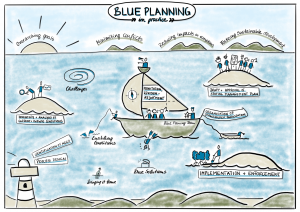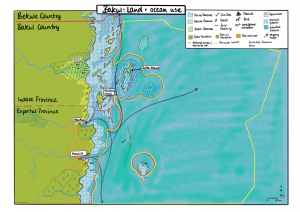New Blue Solutions Training – Blue Planning in Practice
Over the course of one year the Blue Solutions Initiative in cooperation with more than 50 experts and practitioners has developed a new training course on coastal and marine spatial planning. This training course is being designed to enable planners and decision makers to develop and engage in marine and coastal planning and implementation processes in different contexts and settings, at a broad range of scales.
 Many coastal and marine ecosystems and ecosystem services are declining due to increasing and often competing activities and resource uses. The trend is amplified by uncoordinated sector policies and management. Trade-offs exist between the benefits of activities for human well-being and their impacts on marine and coastal ecosystems. Thus, planners are often faced with challenges in applying integrated management principles. For example, allocation of space and ecosystem services among different sectors and stakeholders at appropriate spatial scales.
Many coastal and marine ecosystems and ecosystem services are declining due to increasing and often competing activities and resource uses. The trend is amplified by uncoordinated sector policies and management. Trade-offs exist between the benefits of activities for human well-being and their impacts on marine and coastal ecosystems. Thus, planners are often faced with challenges in applying integrated management principles. For example, allocation of space and ecosystem services among different sectors and stakeholders at appropriate spatial scales.
Blue Planning, i.e. ecosystem-based marine and coastal planning and management is regarded a particularly useful approach to support integration of environment and resource management, economic development and governance priorities at local and national scales. This training course, informed by decades of practical experiences and learning in the field, aims to strengthen practical planning and implementation.
The training package is primarily intended for professionals responsible for the planning and management of coastal and marine areas and their natural resources, not only from the environment sector, but also from other sectors (e.g. fisheries, tourism, transportation, energy, and sea mining), or from cross-sectorial planning and management bodies.
The course is based on a case method, which conveys teaching messages mainly through interactive practical exercises (case work). The training deals with the fictitious country of Bakul, a case closely based on real-life conditions and challenges. The fictitious case allows participants to dive into a matter, free from their own work context and its biases. The methodology can also be applied to a real case, yet this involves further preparation in advance of the training course in order to gather and process necessary information.
Blue Planning does not lead to a final and definitive plan. It is a continuing, iterative process that includes learning and adaptive management over time. The development and implementation of Blue Planning includes a number of elements, comprising the following:
- Identification of need and process design
- Organisation of stakeholder participation
- Inventory and analysis of current and future conditions
- Drafting and approving the spatial management plan
- Implementation and enforcement
- Monitoring, revision and adjustment
These elements are not part of a simple process that moves consecutively from one to the next. Rather, planning is a dynamic process that includes many feedback loops within the process.
The modules contain several training elements: case work group exercises, theoretical inputs and interactive learning sessions. The inputs and exercises build on one another. This didactic training is based on practical experiences and contains real-life case studies (Blue Solutions) showcasing how processes have worked in reality.
The exercises also build on enabling factors and key challenges to Marine Spatial Planning, derived from the studyEvidence-based analysis and practical guidance on the challenges and enabling factors for successful Marine Spatial Planning (UNEP 2016).
 The training material was presented and tested at the IUCN World Conservation Congress for the first time. During a four and a half hours workshop session at the Conservation Campus, 25 participants from all over the world had the opportunity to experience a selected case work of the training.
The training material was presented and tested at the IUCN World Conservation Congress for the first time. During a four and a half hours workshop session at the Conservation Campus, 25 participants from all over the world had the opportunity to experience a selected case work of the training.
Generally, participants appreciated “a great time during the IUCN session”. One participant reported that she “[…] will definitely be using these materials in [her] classes, […] where [she is] trying to work with them on understanding the social aspects of natural resource issues like climate change, marine degradation, etc.”
The next step will be a pilot training in South Africa jointly organized through a partnership of the International Ocean Institute Africa (IOI-A), the “Benguela Current Marine Spatial Management and Governance Project” (MARISMA) by the Benguela Current Commission (BCC) and the German Development Cooperation (GIZ), and the Blue Solutions Initiative. It is held in cooperation with the Department of Environmental Affairs (DEA) of the Republic of South Africa.
For early 2017, a train the trainers is planned in order to enable MSP colleagues/practitioners/trainers to apply the training. A trainer´s manual for the course to provide trainers with additional guidance will also be developed.
For more information, also on other Blue Solutions training on Climate Change Adaptation and Ecosystem Services, please visit Blue Solution website or contact Jan Kleine Büning (jan.kleine@giz.de).
Source: http://bluesolutions.info/new-blue-solutions-training-course-blue-planning-in-practice/

